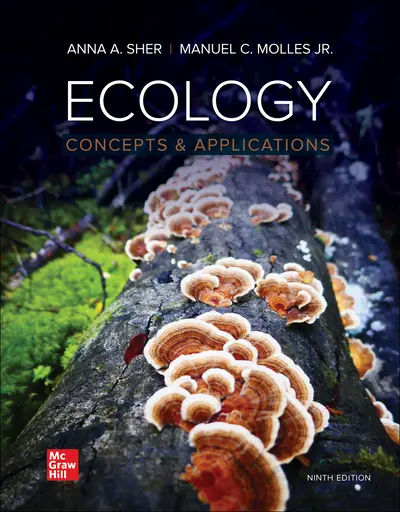My Account Details

ISBN10: 1260722201 | ISBN13: 9781260722208

Ecology: Concepts and Applications
Product not yet available for student view. Change to an older release to view student options.
- Lowest Price!
McGraw Hill eBook
Textbook Rental (150 Days Access)
- Rent for a fraction of the printed textbook price
- Complete text bound in hardcover or softcover
Loose-Leaf Purchase
Unbound loose-leaf version of full text
Shipping Options
- Standard
- Next-day air
- 2nd-day air
Orders within the United States are shipped via FedEx or UPS Ground. For shipments to locations outside of the U.S., only standard shipping is available. All shipping options assume the product is available and that processing an order takes 24 to 48 hours prior to shipping.
Note: Connect can only be used if assigned by your instructor.
Connect (180 Days Access)
- Digital access to a comprehensive online learning platform
- Includes homework, study tools, eBook, and adaptive assignments
- Download the free ReadAnywhere app to access the eBook offline
McGraw Hill eBook
Details:
- Normally the lowest price option for student
- Integrates in your LMS
- Accessible tools for students, including read-aloud functionality, jump links and dynamic note-taking and highlighting features
Textbook Rental (150 Days Access)
Details:
- Rentable option
- Hardcopy and softcover formats
Loose-Leaf Purchase
Details:
- Unbound loose-leaf version of full text
Connect (180 Days Access)
Details:
- Integrates in your LMS
- Prebuilt courses, presentation slides and instructor resources
- Test question banks, adaptive assignments, essay prompts, video content and more interactive exercises specific to your course subject
- eBook access (with included ReadAnywhere app)
- Print book add-on availability
- Remote proctoring
* The estimated amount of time this product will be on the market is based on a number of factors, including faculty input to instructional design and the prior revision cycle and updates to academic research-which typically results in a revision cycle ranging from every two to four years for this product. Pricing subject to change at any time.
Ecology: Concepts and Applications was written for students taking their first undergraduate course in ecology. The authors have assumed that students in this one-semester course have some knowledge of basic chemistry and mathematics and have had a course in general biology, which included introductions to evolution, physiology, and biological diversity.
Section I Natural History and Evolution
2 Life on Land
3 Life in Water
4 Population Genetics and Natural Selection
Section II Adaptations to the Environment
5 Temperature Relations
6 Water Relations
7 Energy and Nutrient Relations
8 Social Relations
Section III Population Ecology
9 Population Distribution and Abundance
10 Population Dynamics
11 Population Growth
12 Life Histories
Section IV Interactions
13 Species Interactions and Competition
14 Exploitative Interactions: Predation, Herbivory, Parasitism, and Disease
15 Mutualism
Section V Communities and Ecosystems
16 Species Abundance and Diversity
17 Species Interactions and Community Structure
18 Primary and Secondary Production
19 Nutrient Cycling and Retention
20 Succession and Stability
Section VI Large-Scale Ecology
21 Landscape Ecology
22 Geographic Ecology
23 Global Ecology
About the Author
Anna Sher
Manuel Molles
Need support? We're here to help - Get real-world support and resources every step of the way.